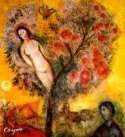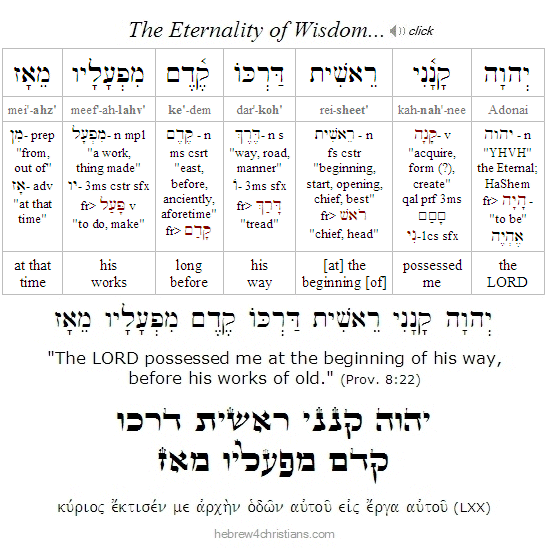|
The Scroll of Genesis (סֵפֶר בְּרֵאשִׁית) is truly the "beginning," the "root," and the "seedbed" of all the subsequent Scriptures - including the message of the gospel and the revelation of the New Testament. In Genesis we see the creation and ruin of man through sin, but we take hold of the promise of deliverance through the coming Seed of the woman; in the Book of Exodus (שְׁמוֹת) we see God's powerful redemption secured through the blood of the Lamb; in the Book of Leviticus (וַיִּקְרָא) we encounter communion and atonement in the holy sanctuary; in the Book of Numbers (בַּמִדְבַּר) we experience the leading of God through desert places, and in the Book of Deuteronomy (הַדְּבָרִים) we are renewed by God's faithfulness before we take hold of our inheritance. Ultimately, the concluding book of the Bible, the Book of Revelation, serves as a climactic "final chapter" of the story begun in Genesis, where the Tree of Life (עֵץ הַחַיִּים) is restored to the midst of the paradise of God, and the presence of sin and death have been forever eradicated....
Everything begins with the foundational truth that Almighty God is our personal Creator (הַבּוֹרֵא). This is the first principle and axiom of all rational thinking: "In the beginning (בְּרֵאשִׁית), God created the heavens and the earth" (Gen. 1:1). Notice that the word "beginning," i.e., bereshit, comes from the word reishit (רֵאשִׁית), meaning first or best (Psalm 111:10), which does not necessarily mean "the beginning" in a temporal sense (הַרִאשׁוֹן), but rather primacy or rulership over all that exists. Indeed, the word includes the root idea of "head" (ראשׁ), which suggests the "head of all things," that is, to the Messiah, the Creative Word of God who is the "head of all beginning and authority" and through Whom and for Whom all things were created (Col. 1:16; 2:10).
Many of the traditional sages state that "in the beginning" (בְּרֵאשִׁית) refers to the wisdom of the Torah. Quoting Proverbs 8:22, these sages actually say that God created the world for the sake of Torah, what they call "reshit darko" (רֵאשִׁית דַּרְכּוֹ). In other words, wisdom (i.e., chokhmah: חָכְמָה) is personified as the Torah, the Agency of Power that created the universe. In light of the New Testament, we understand the divine wisdom personified as Yeshua our Messiah - the expression of God's will in creation... the manifestation of the "strong arm" of the LORD and his mighty power that created the enormous complexity of the universe yesh ma'ayin, "out of nothing..." Indeed, Yeshua is the Living Torah (i.e., ha'Torah ha'chayim: התורה החיה) and the Lamb slain before the foundation of the world - the One revealed before creation as its source and end. As it says in the New Testament: בְּרֵאשִׁית הָיָה הַדָּבָר - "in the beginning was the Word," וֵאלהִים הָיָה הַדָּבָר - and God was the Word... הַכּל נִהְיָה עַל־יָדוֹ - All things were made by Him, and without Him was not anything made that was made (John 1:1,3). Followers of the Messiah Yeshua do not worship a book, though the LORD our God is indeed the faithful Lawgiver, the Source of all truth and therefore he can never contradict the perfections of his own inner nature. Only the LORD God Almighty receives the glory of creation forever and ever (Rev. 4:11).
God "emptied himself" by freely chosing to create the universe in order to share his wisdom, glory, and love with other beings he created... All this was for the sake of the Messiah, who built the world in chesed (חֶסֶד) and who forever reigns as the King of eternal life and love.
יהוה קנני ראשׁית דרכו
קדם מפעליו מאז
Adonai · ka·nah'·nee · re·sheet · dar·koh
ke'·dem · meef·a·lav · mei·ahz

"The LORD possessed me at the beginning of his way,
before his works of old" (Prov. 8:22)
Proverbs 8:22 Hebrew reading lesson (click):
The Torah of Creation...
The Book of Genesis itself (סֵפֶר בְּרֵאשִׁית) begins by stating that on the "first day" God created the heavens and the earth:
בראשׁית ברא אלהים
את השׁמים ואת הארץ
be·rei·sheet · bah·rah · E·loh·heem
et · ha·shah·ma'·yeem · ve·et · hah·ah'·retz

"In the beginning God created
the heavens and the earth" (Gen. 1:1)

Genesis 1:1 Hebrew reading lesson (click):
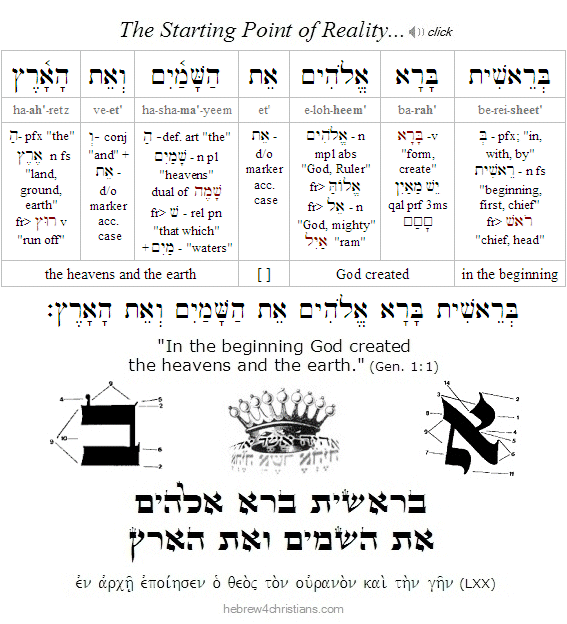 |
The term "heavens" here (שָׁמַיִם) refers metaphorically to God's exalted throne that was surrounded by innumerable angels who were present at the time of creation (Job 38:4-7), and the term "earth" (אָרֶץ) refers to a state of watery chaos (from רוּץ, suggesting running water) that was part of the primordial material of creation itself (indeed the word for "heavens," sha- (ש) + mayim (מַיִם), implies a connection with the original waters (mayim) of creation). God then created the divine light and separated it from darkness (Gen. 1:3-5). On the second day, God separated the waters to create the atmosphere (Gen. 1:6-8); on the third day, God separated the earth from the waters and created vegetative life and seeds (Gen. 1:9-13). On the fourth day, the cycle was renewed: God first created the celestial lights (sun, moon, stars) to mark the seasons and time (Gen. 1:14-19). On the fifth day, He brought forth fish from the waters and birds from the atmosphere (Gen. 1:20-23), and on the sixth day, God brought forth living creatures from the earth (Gen. 1:24-25), culminating in the creation of mankind in his image and likeness (Gen. 1:26-31). Of Adam, it was written, "whose father was God" (Luke 3:38), since he bore the divine seed that was to be "planted" and rooted in God's house of creation. The rest of the Bible, in a sense, is the story of the "prodigal son" and how he returns home to his father...
In the account of the creation (בְּרִיאָה) given in Genesis, it is important to understand that the grammar of the text clearly speaks of creation in six literal days... The Hebrew word yom (יוֹם), or "day," always refer to a distinct 24 hour solar day when it is used in reference to evening and morning or when used in reference to a stated number of days. The formula, "it was evening, and it was morning, one day" (וַיְהִי־עֶרֶב וַיְהִי־בקֶר יוֹם אֶחָד), further indicates that day follows night, since light was created (and separated) out of darkness. This explains why we start the Sabbath and festivals at sunset of the night before. The idea of a literal six days of creation is also the foundation for the weekly Sabbath itself: "For in six days the LORD made heaven and earth, the sea, and all that is in them, and rested on the seventh day. Therefore the LORD blessed the Sabbath day and made it holy" (Exod. 20:11).
The idea that "day" refers to an indefinitely long period of geological time is a modern invention based on Enlightenment ideals of science.... Attempting to reconcile so-called evolutionary theory with the account of creation given in the Torah actually undermines the message of the gospel itself, since it puts death, disease, suffering, etc., before the transgression of Adam and Eve. Moreover, it is evident that Yeshua believed in the literal creation of Adam and Eve (Mark 10:6) and therefore he held to a "young earth" theory, just as he believed in a worldwide (not local) flood during the days of Noah (Matt. 24:37-39).
Likewise the so-called "gap theory" (i.e., the idea that there is a "gap" of time between Gen. 1:1 and Gen. 1:2 wherein Satan was judged causing God to re-create the earth) is obviously in error since it disregards the testimony of Yeshua regarding the uniqueness of the creation of Adam and Eve "in the beginning," and it furthermore undermines the radical consequence of their sin. Neither does it adequately explain the mystery of evil (i.e., the presence of the "monster in the garden") nor the exile from the garden because of Adam and Eve's disobedience... It is true that later judgments of God allude to the idea of "tohu va'vohu" (e.g., Isa 34:11; Jer 4:23), but it must be stressed that this usage in the prophets should not be "read into" the description of the earth during creation.... There is no mention of a "gap" theory in the Scriptures, so it is an argument from silence, really, though there is a lot of witchcraft and midrash that talk about Lilith, etc. as Adam's first wife, etc. In the Fourth Commandment it is clearly stated that the heavens, the earth, the seas, and all that is in them were created in literally six days (Exod. 20:11). That God created the universe over a six day period (rather than in a single instant) is of course a mystery, though it is attested quite literally by the the hand of God Himself (Exod. 24:12; 31:18).
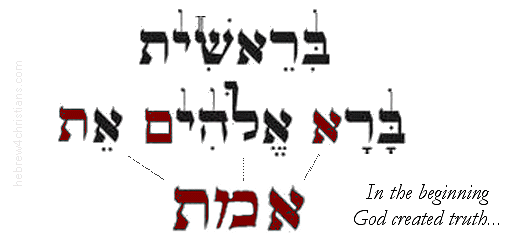 |
The Divine Light (האור האלוהי) of the first day of creation (Gen 1:3) is not the same as the light issuing from the cosmic spheres. God created the sun, moon, and stars on the fourth day to demonstrate that everything in the universe was created through the light of His Word (Gen. 1:14-19). If the sun had been created before everything else (big bang), it could have been said that the world was without beginning, and the earth produced life through the influences of astronomical bodies. The Torah states that plants were created before the sun and moon to indicate that nothing can exist apart from God's sovereign will. וַיְהִ... יְהִי, yehi...vaihi: God called everything into being by the Word of His Power (בִּדְבַר גְּבוּרָתוֹ). Therefore we recite the blessing: Barukh atah Adonai Eloheinu melekh ha'olam shehakol niyah bidvaro, translated as: "Blesssed are You, LORD our God, Master of the Universe, who brings forth all things by His Word."
וַיּאמֶר אֱלהִים יְהִי אוֹר וַיְהִי־אוֹר
וַיַּרְא אֱלהִים אֶת־הָאוֹר כִּי־טוֹב
וַיַּבְדֵּל אֱלהִים בֵּין הָאוֹר וּבֵין הַחשֶׁךְ
וַיִּקְרָא אֱלהִים לָאוֹר יוֹם וְלַחשֶׁךְ קָרָא לָיְלָה
וַיְהִי־עֶרֶב וַיְהִי־בקֶר יוֹם אֶחָד
vai·yoh'·mer · E·loh·heem · ye·hee · ohr · vai·hee · ohr
vai·yahr · E·loh·heem · et - hah·ohr · kee- tohv
vai·yav·deil · E·loh·heem · bein · hah·ohr · oo·vein · ha·choh'·shekh
vai·yeek·rah · E·loh·heem · lah·ohr · yohm · ve·la·choh'·shekh · kah'·rah · lai'·lah
vai·hee - e'·rev · vai·hee - voh'·ker · yohm · e·chad

"And God said, "Let there be light," and there was light.
And God saw that the light was good.
And God separated the light from the darkness.
God called the light Day, and the darkness he called Night.
And there was evening and there was morning, the first day."
(Gen. 1:3-5)
Note that the word "light" (אור) appears five times in this passage, which prompted the sages to say there are five kinds of light, each corresponding to a book of the Torah. "Let there be light" (יְהִי אוֹר) refers to the Book of Genesis and the Divine Light of Messiah; "and there was light" (וַיְהִי־אוֹר) refers to the Book of Exodus, when during their deliverance from Egypt Israel had the redemptive light of Messiah within their homes; "God saw the light" (וַיַּרְא אֱלהִים אֶת־הָאוֹר) refers to the Book of Leviticus, which deals with the light of Messiah's sacrifice and atonement - the light of teshuvah; "God separated the light from the darkness" (וַיַּבְדֵּל אֱלהִים בֵּין הָאוֹר וּבֵין הַחשֶׁךְ) refers to the Book of Numbers, when God judges evil by the truth of King Messiah; and finally, "God called the light Day" (וַיִּקְרָא אֱלהִים לָאוֹר יוֹם) refers to the Book of Deuteronomy, which enlightens the eyes of the one who loves the Messiah b'khol levavkha, with all of the heart...
Genesis 1:3 Hebrew reading lesson (click):
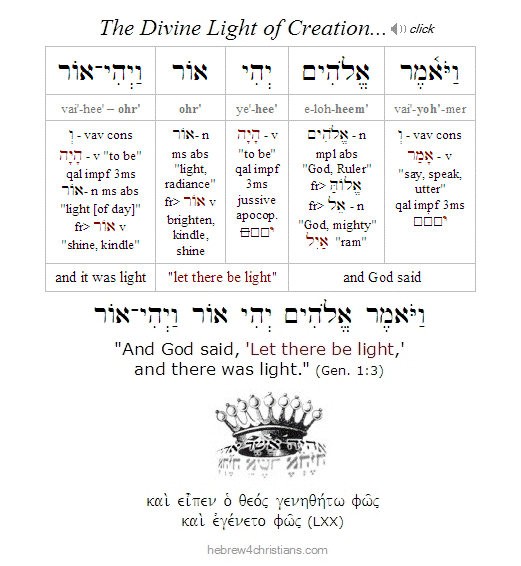 |
|


